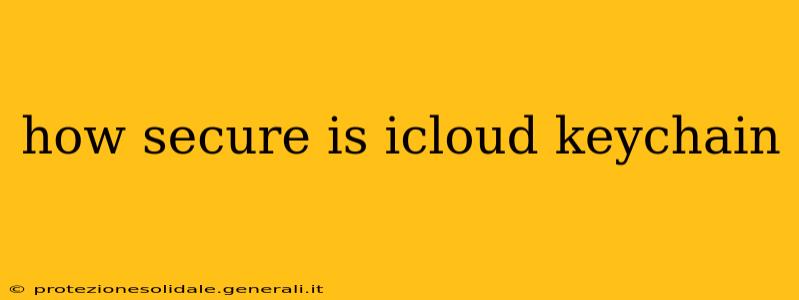iCloud Keychain is Apple's built-in password manager, offering a convenient way to store and manage your website logins, app passwords, credit card information, and more. But how secure is it really? This in-depth look examines the security features of iCloud Keychain, addressing common concerns and helping you understand how to maximize its protection.
What is iCloud Keychain?
iCloud Keychain is a key component of Apple's ecosystem, designed to streamline your digital life by securely storing your sensitive information. It uses end-to-end encryption, meaning only you (and those you explicitly grant access to) can decrypt and access your data. This encryption happens on your device before your information ever reaches Apple's servers.
How Secure is the Encryption?
iCloud Keychain uses strong encryption algorithms, protecting your data both in transit and at rest. The specific algorithms are constantly evolving and updated by Apple to reflect the latest cryptographic best practices. This proactive approach helps to ensure your information remains protected against emerging threats.
Is My Data Stored on Apple's Servers?
Yes, your iCloud Keychain data is stored on Apple's servers, but this doesn't mean it's accessible to Apple or anyone else without your permission. The end-to-end encryption ensures that even Apple cannot access your passwords or other sensitive information. Your data is encrypted with a unique key that only you know (or, more accurately, your devices know, secured with your device passcode or biometric authentication).
How Does Two-Factor Authentication Enhance Security?
Enabling two-factor authentication (2FA) for your Apple ID significantly strengthens the security of your iCloud Keychain. Even if someone gains access to your password, they'll still need access to your trusted device (like your iPhone or iPad) to authorize logins and access your data. This adds a critical layer of protection against unauthorized access.
What happens if I lose my iPhone/iPad?
Losing your device can be concerning, but iCloud Keychain's security mechanisms mitigate the risk. If you've enabled Find My iPhone, you can remotely erase your device, including all your data, preventing unauthorized access. Furthermore, you'll need to verify your identity through other trusted methods to access your iCloud Keychain data on a new device.
Does iCloud Keychain Protect Against Phishing Attacks?
While iCloud Keychain itself doesn't directly prevent phishing attacks, it significantly reduces the risk. By securely storing your passwords, it prevents the reuse of weak or compromised passwords across multiple sites. This makes it considerably harder for phishers to gain access to your accounts, even if you fall victim to a sophisticated phishing attempt.
How can I make iCloud Keychain even more secure?
- Use a strong, unique passcode for your device: This is the foundation of your iCloud Keychain's security.
- Enable two-factor authentication: This adds an extra layer of protection against unauthorized access.
- Keep your software updated: Apple regularly releases security updates that patch vulnerabilities. Make sure your devices are running the latest iOS/iPadOS and macOS.
- Be cautious of suspicious links and emails: Don't click links from unknown senders.
- Regularly review your Keychain: Check for any unfamiliar entries or compromised credentials.
Is iCloud Keychain Better Than Other Password Managers?
Whether iCloud Keychain is "better" than other password managers depends on individual needs and priorities. It excels in its seamless integration with the Apple ecosystem and its strong end-to-end encryption. However, other password managers might offer additional features, like advanced security audits or cross-platform compatibility beyond Apple devices. The best choice depends on your specific security needs and preferences.
In conclusion, iCloud Keychain offers a robust and convenient way to manage your passwords and other sensitive information, providing a strong level of security when used correctly and coupled with best practices. By utilizing the features discussed above and remaining vigilant about online security, you can significantly reduce your risk of unauthorized access.
